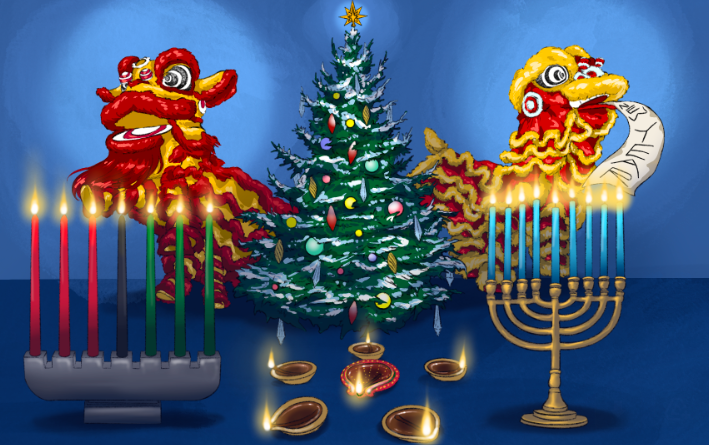With winter break approaching, the holiday season is upon us. While we might know Christmas as a big holiday in America, it’s important to recognize the numerous holidays celebrated across the country and world — and by students at NC State.
Hanukkah
This holiday begins on the 25th day of the Hebrew calendar month, Kislev, and can fall anywhere from late November to late December and lasts eight days. This year, Hanukkah will begin the evening of Dec. 7 and go until Dec. 15. On each of the eight evenings, a candle is lit on the menorah, which is a candelabrum used in Jewish worship.
Hanukkah is a celebration of the rededication of the Temple of Jerusalem, as the word “Hanukkah” means dedication in Hebrew. The holiday also serves as a time to remember difficult moments in their history.
Some traditions include children playing dreidel to win gelt, which are chocolate coins, and the making of latkes, potato pancakes along with other items cooked in oil to appreciate the miracle of the one cruse of oil that lasted eight days.
Eliana Harr is a second-year studying elementary education and member of NC State’s Hillel chapter, a gathering place for Jewish students to explore their heritage and celebrate holidays. Harr said she’s expecting to celebrate one of her favorite traditions once at home for the holiday.
“One tradition that my family has that I really love and that I’m excited to go home for Hanukkah for is we have this big table in like the entrance of our house, and my mom puts a million menorahs, like she puts out a ton of menorahs, right on the table when you walk in,” Harr said.
Emily Gott, a second-year studying horticulture and member of Hillel, said while she’s away from her family, she still keeps the traditions going.
“My family, since we’re all kind of in different places in college, we light the menorah every night but we try to FaceTime as we do it, so like we’re still doing it together,” Gott said. “So I guess it’s like a new tradition.”
Diwali
Diwali, also known as the Festival of Lights, is one of India’s major holidays and lasts for five days every year. During the five days, people spend their time at feasts, taking part in festive gatherings, fireworks displays and praying. This holiday is dedicated and associated with Lakshmi, the goddess of prosperity, and the lights symbolize knowledge over ignorance and the victory of light over darkness.
Yash Agarwal, a third-year studying computer science, is a member of Hindu YUVA at NC State, which organized a Diwali celebration at Talley Student Union on Nov. 17.
Agarwal said celebrating Diwali helps remember home and recognize a part of one’s identity.
“I think it kind of reminds you of home; … it’s something that shines out in your own identity,” Agarwal said. “And to me, personally, it allows you to kind of have that sense of self-expression because it is a part of your culture, your religion, your identity and your traditions.”
Kwanzaa
Kwanzaa, a week-long celebration of African and African American culture and family, occurs every year from Dec. 26 to Jan. 1. The holiday ends with a festive and communal gathering called the Feast of Faith, also known as Karamu Ya Imani.
During this week, families come together to share a feast, celebrate their ancestors, celebrate their culture and affirm their relationships. Each day, a candle is lit to represent the principle of the day and various activities are done, such as reciting poetry or drumming, to highlight each principle.
The NC State African American Cultural Center celebrated the holiday early this year, in order to align with the University’s calendar. On Nov. 17, they held a Feast of Faith to explore the history and seven principles of Kwanzaa.
Lunar New Year
Lunar New Year is the first day of the lunar calendar and commemorates the arrival of spring and the new year. Although commonly referred to as Chinese New Year, the term “Lunar New Year” is becoming increasingly popular since it is celebrated by many cultures throughout the world. It is the most important holiday in China but is also widely celebrated by Vietnam, South Korea and other East Asian countries.
The length of this celebration frequently extends to 15 days, and some activities of this festival include lion and dragon dances, temple fairs, market shopping and traditional food and drink of the holiday. Prior to the festivities, people will clean their houses of dirt and unwanted items, and decorate them with lanterns, new furniture and flowerpots.
Christmas
Although celebrated by many people outside of the religion, Christmas is a Christian holiday celebrating the birth of Jesus Christ. This holiday is celebrated every year Dec. 25, but its spirit extends beyond this day with the lit-up houses in neighborhoods filled with decorations and the frequent playing of Christmas carols at homes, restaurants and stores throughout the month of December.
A common tradition of this holiday is putting up a tree in your house and spending an evening decorating it with ornaments, lights and family heirlooms of sorts. On Christmas morning, presents are placed under the tree, and families spend the morning around it opening gifts one-by-one.








